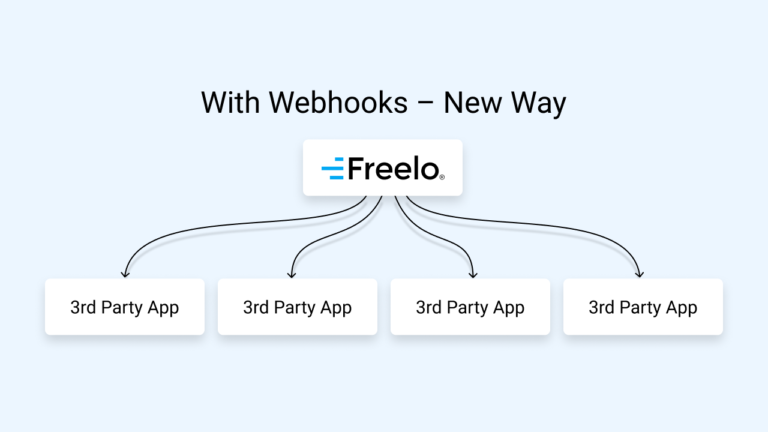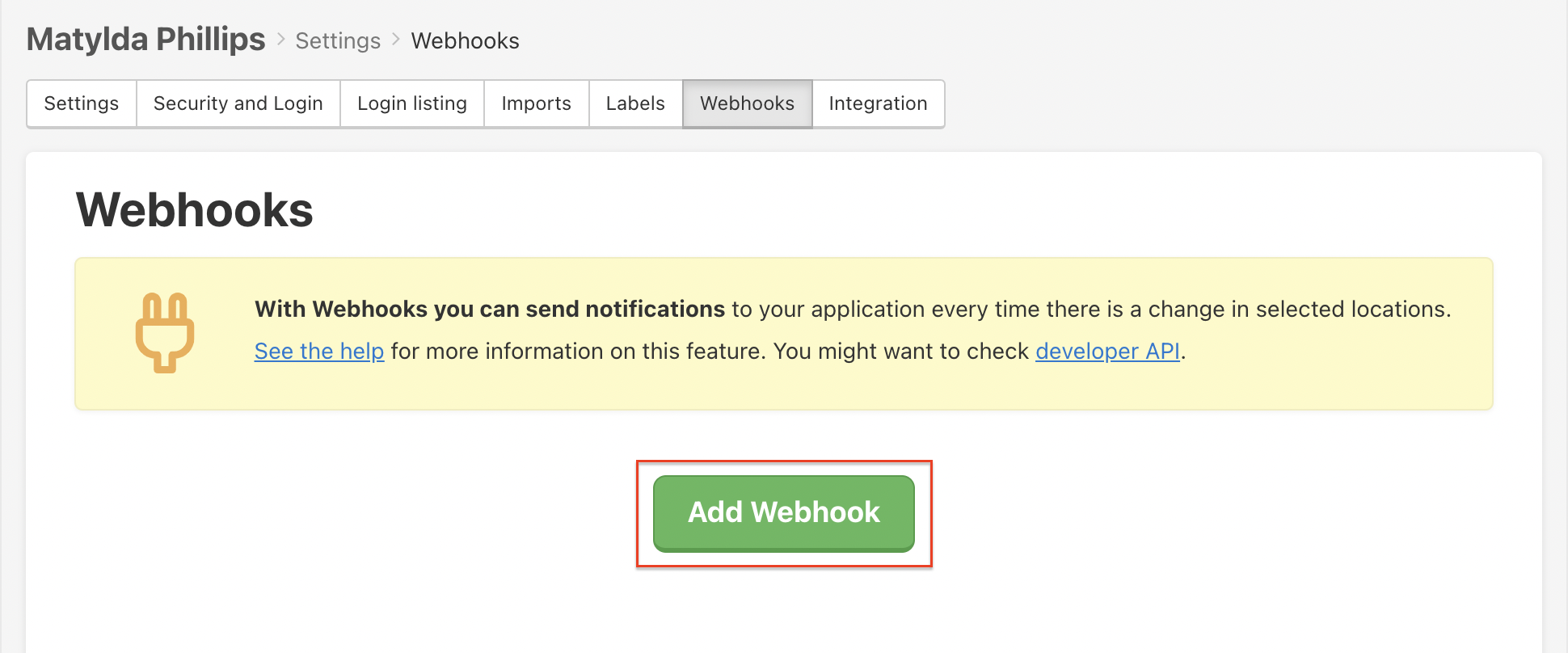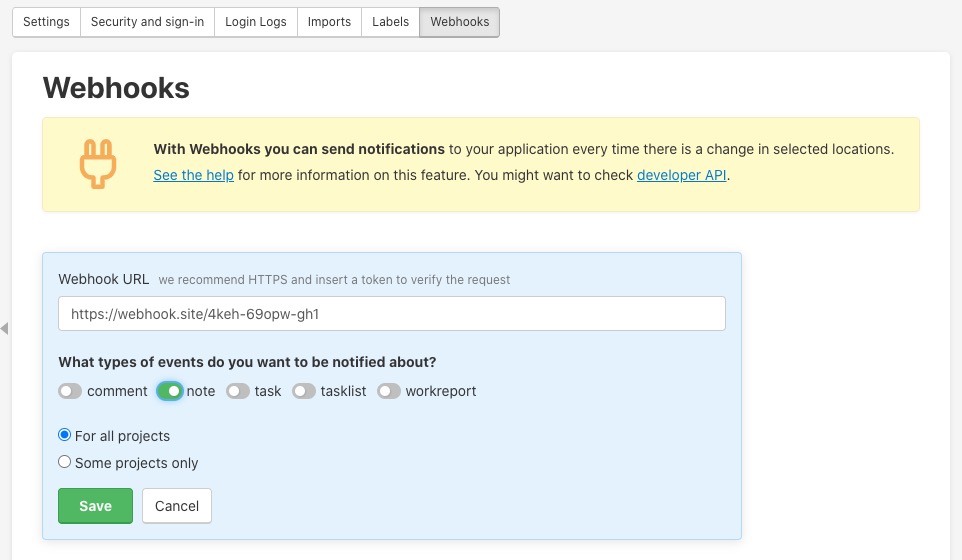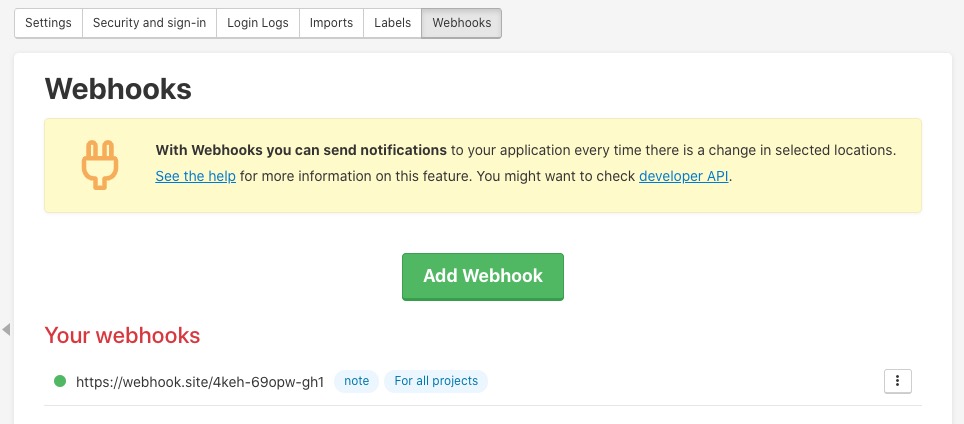Freelo can notify your application when something is changed through webhooks. A webhook consists of a payload URL to be called (must be HTTPS) and a list of types that trigger calls.

How does a Webhook work
Freelo will attempt to call the payload URL up to 10 times before deactivating the webhook. The duration between attempts grows exponentially to give your service time to recover. Last call is after 5 hours. Freelo considers only a HTTP status code in the 2xx range to be a successful response. Freelo does not follow a 3xx redirect.
Whenever the event is created for any of the types that webhook was created to match, Freelo calls your payload URL. All payloads follow the same JSON format. Only the “data” element is different for every event type.
As you will note, the recording format is the basic generic format that all other content endpoints share, with the addition of a data field.
After sending the payload, Freelo will record the interaction with your application as a delivery record that can be checked for debugging. The delivery record includes responses that occurred for that specific event relay. Freelo keeps the last 5 attempts.
What are Webhooks good for?
- Have your Timesheets in another system. For example, record the attendance directly to Google Spreadsheet.
- Send a notification email when someone deletes a task in your project or only in case it is an external colleague.
- Send a notification about finished tasks to Slack or any other app your team is using.
Types of Webhooks
Webhook can be subscribed to creation, updates or deletion for these items:
- Task
- Tasklist (To-Do list)
- Note
- Comment
- Reports
Webhook can be subscribed to all your projects or selected ones only.
How to create a new Webhook
You can set up new connections directly in Freelo. Go to Settings via your avatar in the top right corner and then section Webhooks.

Just click Add Webhook.

Type the URL address where you want the information to be sent from Freelo. Choose the type of event and which projects you are interested in and click Save.

After adding a new webhook it appears in the list of Your webhooks.

How to test a Webhook
Each webhook can be easily tested and we would recommend using the service Webhook.site. The site generates a unique URL address that records all your calls and then shows them to you.

Check all your calls and data in JSON format.

We have prepared a sample PHP script to process payload in our GitHub. There you can find the script that sends a notification email when someone deletes a task in a project.
Events triggering Webhooks
- Item created
- Item updated
- Tasklist
- change state to finished
- change name
- Task
- change state to finished
- change name
- change the due date or the end of due date
- change assignee
- change priority
- Comment
- change content
- Note
- change content
- change name
- Work report
- change date, time, cost, budget or task
- Tasklist
- Item deleted
Examples
Have a look at the examples of particular Webhooks.
Task
{
"type": "task_created",
"created_at": "2020-06-29T15:47:52+02:00",
"author": {
"id": 1,
"fullname": "Karel Dytrych"
},
"data": {
"id": 11,
"name": "Task Name",
"priority enum": "m",
"due_date": "2020-06-29T15:47:52+02:00",
"due date end": null,
"date_add": "2020-06-29T15:47:52+02:00",
"author": {
"id": 1,
"fullname": "Karel Dytrych"
},
"worker": {
"id": 546,
"fullname": "Robert De Niro"
},
"task list": {
"id": 1,
"name": "to do list",
"state": {
"id": 1,
"state": "active"
}
},
"project": {
"id": 1,
"name": "Webhook example",
"state": {
"id": 1,
"state": "active"
}
},
"state": {
"id": 1,
"state": "active"
}
}
}
Task list
{
"type": "task list edited",
"created_at": "2020-07-13T15:40:32+02:00",
"author": {
"id": 566,
"fullname": "John Doe"
},
"data": {
"id": 3136,
"name": "Webhooks",
"project": {
"id": 1054,
"name": "Project webhooks",
"state": {
"id": 1,
"state": "active"
}
},
"state": {
"id": 1,
"state": "active"
}
}
}
Note
{
"type": "document edited",
"created_at": "2020-07-13T15:43:32+02:00",
"author": {
"id": 566,
"fullname": "John Doe"
},
"data": {
"id": 1546,
"content": null,
"name": "Webhook note",
"date_add": "2020-07-13T15:43:25+02:00",
"author": {
"id": 566,
"fullname": "John Doe"
},
"project": {
"id": 1054,
"name": "Project webhooks",
"state": {
"id": 1,
"state": "active"
}
},
"state": {
"id": 1,
"state": "active"
}
}
}
Comment
{
"type": "comment created",
"created_at": "2020-07-13T15:41:37+02:00",
"author": {
"id": 566,
"fullname": "John Doe"
},
"data": {
"id": 266383,
"content": "My comment content",
"date_add": "2020-07-13T15:41:37+02:00",
"author": {
"id": 566,
"fullname": "John Doe"
},
"project": {
"id": 1054,
"name": "Project webhooks"
},
"task list": {
"id": 3136,
"name": "Webhooks",
"state": {
"id": 1,
"state": "active"
}
},
"task": {
"id": 25848,
"name": "Example webhooks",
"state": {
"id": 1,
"state": "active"
}
}
}
}
Report
{
"type": "work report edited",
"created_at": "2020-07-13T15:05:20+02:00",
"author": {
"id": 566,
"fullname": "John Doe"
},
"data": {
"id": 4652,
"date_add": "2020-07-13T14:56:43+02:00",
"date_reported": "2020-07-13T14:19:00+02:00",
"minutes": 38,
"cost": {
"amount": "121",
"currency": "CZK"
},
"note": "my work note",
"author": {
"id": 566,
"fullname": "John Doe"
},
"project": {
"id": 36,
"name": "My project",
"state": {
"id": 1,
"state": "active"
}
},
"task list": {
"id": 3066,
"name": "John",
"state": {
"id": 1,
"state": "active"
}
},
"task": {
"id": 26063,
"name": "My task name",
"state": {
"id": 1,
"state": "active"
}
}
}
}